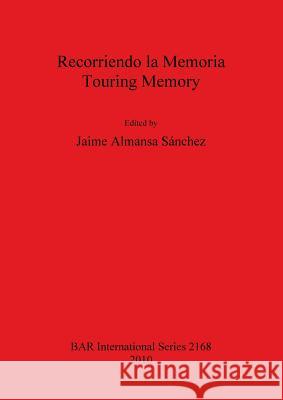Recorriendo la Memoria / Touring Memory » książka
Recorriendo la Memoria / Touring Memory
ISBN-13: 9781407307121 / Hiszpański / Miękka / 2010 / 114 str.
This volume is a collection of papers given at a session at the JIA 2009 conference. The thread of the contributions focuses on two concepts: Memory and Archaeology. The word Memory refers to the past, our individual memories and the collective ones. Wander around memory (Recorrer la memoria) is a Spanish phrase that means to think in order to remember what happened. Now that retrieving (historical) memory is changing from being a commitment to being a fashion, it is more needed to wander around memory to set our position as professionals in archaeology. All the contributions in this volume share a common idea: the analysis of memories generated from conflict. Too frequently, collective memory brews around different traumatic events framed in armed conflicts. Conflict generates memory, but memory generates conflict too, feeding a vicious circle manifested in some of the processes to retrieve historical memory that are still open today. Contents: Touring Memory Recorriendo la Memoria (Jaime Almansa Sanchez); La construccion de memoria arqueologica en casos de detenidos desaparecidos en Chile durante la dictadura militar (1973-1990) 7/ The construction of archaeological memory en the cases of missing arrested in Chile during the military dictatorship (1973-1990) (Carlos Carrasco Gonzalez); Restitucion o reinstitucion? Acerca del papel de la Arqueologia en el proceso de recuperacion de la memoria historica en Argentina (1976-1983) / Restitution or reinstitution? About Archaeologicals role on historical memory recovering process in Argentina (1976-83) (Soledad Biasatti and Gonzalo Company); Arqueologia de la Politica: Presentando la interpretacion del pasado nacional / The Archaeology of Politics: Presenting interpretation of the nations past (Jin Soo Park) / Tergiversando el pasado: ejemplos desde Serbia / Misconstructing the past: examples from Serbia (Kristina Penezic and Jovana Tripkovic) Cultura Material e Ideologia: construyendo identidad de las cosas eternas bajo las dictaduras fascistas de Italia y Portugal / Material Culture and Ideology: constructing identity of timeless things under Italian and Portuguese fascist dictatorships (Sergio Gomes); Fosas comunes y la aparicion de la memoria historica espanola / Mass Graves and the Emergence of Spanish Historical Memory (Ignacio Fernandez De Mata); Las fosas comunes de la Guerra Civil Espanola del arroyo Romanzal. La actividad represiva franquista en Llerena (Badajoz, Espana) durante los primeros dias de ocupacion. Contribucion a la memoria / The Spanish Civil War mass graves of Arroyo Romanzal. Francos repressive activities in Llerena (Badajoz, Espana) during the first days of occupation. A contribution to memory (Laura Munoz Encinar and Francisco Javier Garcia Vadillo) Exhumando el legado material de la represion franquista. De la percepcion social a la encrucijada juridica y patrimonial / Exhuming the material legacy of Francoist repression. From social perception to legal and heritage crossroads (Juan Montero Gutierrez); La contribucion de la arqueologia forense a la lucha contra el olvido / The contribution of forensic archaeology in the fight against oblivio (Alba Aran Herrera, David Garcia Casas and Ivan Sanchez Marcos); Carcel de Carabanchel. Historia y Movimiento vecinal / Carabanchel jail. History and local action (Pascual Jimenez del Castillo and Veronica Garcia Coca); La memoria del conflicto y el conflicto con la memoria. El papel de la fotografia amate / The memory of conflict and the conflict with memo. The role of amateur photography (Beatriz del Mazo Fernandez)
This volume is a collection of papers given at a session at the JIA 2009 conference. The thread of the contributions focuses on two concepts: Memory and Archaeology. The word Memory refers to the past, our individual memories and the collective ones. Wander around memory (Recorrer la memoria) is a Spanish phrase that means to think in order to remember what happened. Now that retrieving (historical) memory is changing from being a commitment to being a fashion, it is more needed to wander around memory to set our position as professionals in archaeology. All the contributions in this volume share a common idea: the analysis of memories generated from conflict. Too frequently, collective memory brews around different traumatic events framed in armed conflicts. Conflict generates memory, but memory generates conflict too, feeding a vicious circle manifested in some of the processes to retrieve historical memory that are still open today.











